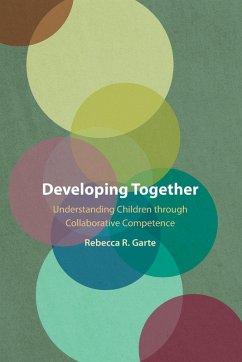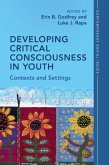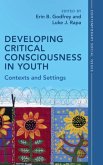Rebecca R. Garte (City University of New York)
Developing Together
Rebecca R. Garte (City University of New York)
Developing Together
- Broschiertes Buch
- Merkliste
- Auf die Merkliste
- Bewerten Bewerten
- Teilen
- Produkt teilen
- Produkterinnerung
- Produkterinnerung
Scholars and practitioners within psychology and education will find new insights into the development of children considered at-risk. The approach of this book highlights overlooked strengths specifically grounded in majority-world cultures. Details of applying the methodology to multiple contexts are provided.
Andere Kunden interessierten sich auch für
![Developing Critical Consciousness in Youth Developing Critical Consciousness in Youth]() Developing Critical Consciousness in Youth32,99 €
Developing Critical Consciousness in Youth32,99 €![Developing Critical Consciousness in Youth Developing Critical Consciousness in Youth]() Developing Critical Consciousness in Youth95,99 €
Developing Critical Consciousness in Youth95,99 €![Range Range]() David EpsteinRange22,99 €
David EpsteinRange22,99 €![Connecting Creativity and Motivation Research with End Users Connecting Creativity and Motivation Research with End Users]() Fredricka Reisman (Drexel University)Connecting Creativity and Motivation Research with End Users37,99 €
Fredricka Reisman (Drexel University)Connecting Creativity and Motivation Research with End Users37,99 €![The Cambridge Handbook of Democratic Education The Cambridge Handbook of Democratic Education]() The Cambridge Handbook of Democratic Education77,99 €
The Cambridge Handbook of Democratic Education77,99 €![Rehabilitation and Remediation of Internationally Adopted Children Rehabilitation and Remediation of Internationally Adopted Children]() Boris GindisRehabilitation and Remediation of Internationally Adopted Children27,99 €
Boris GindisRehabilitation and Remediation of Internationally Adopted Children27,99 €![Rehabilitation and Remediation of Internationally Adopted Children Rehabilitation and Remediation of Internationally Adopted Children]() Boris GindisRehabilitation and Remediation of Internationally Adopted Children118,99 €
Boris GindisRehabilitation and Remediation of Internationally Adopted Children118,99 €-
-
Scholars and practitioners within psychology and education will find new insights into the development of children considered at-risk. The approach of this book highlights overlooked strengths specifically grounded in majority-world cultures. Details of applying the methodology to multiple contexts are provided.
Produktdetails
- Produktdetails
- Verlag: Cambridge University Press
- Seitenzahl: 277
- Erscheinungstermin: 12. Juni 2025
- Englisch
- Abmessung: 229mm x 152mm x 15mm
- Gewicht: 414g
- ISBN-13: 9781009446662
- ISBN-10: 1009446665
- Artikelnr.: 73483891
- Herstellerkennzeichnung
- Libri GmbH
- Europaallee 1
- 36244 Bad Hersfeld
- gpsr@libri.de
- Verlag: Cambridge University Press
- Seitenzahl: 277
- Erscheinungstermin: 12. Juni 2025
- Englisch
- Abmessung: 229mm x 152mm x 15mm
- Gewicht: 414g
- ISBN-13: 9781009446662
- ISBN-10: 1009446665
- Artikelnr.: 73483891
- Herstellerkennzeichnung
- Libri GmbH
- Europaallee 1
- 36244 Bad Hersfeld
- gpsr@libri.de
Rebecca R. Garte is Professor of Teacher Education at the City University of New York (CUNY), who has published extensively in the areas of developmental psychology and teacher education. As a recipient of a large-scale grant from the W. K. Kellogg Foundation, she led the comprehensive educator empowerment program, a multi-year research practice partnership with New York City public schools.
Part I. Collaborative Competence in Pursuit of a Culturally Valid Account
of Social Development: 1. Why a new direction is necessary; 2. Can the self
be relational? Culture at the root of psychology; Part II. Elements of
Collaborative Competence: Expanding on Prior Research: 3. Redefining
subjectivity and intersubjectivity for a new method; 4. Framing
intersubjectivity during children's interactions: a critical examination of
theories and methods; 5. What makes for 'high quality' interactions at home
and school; 6. Collaborative competence: A new model of development; Part
III. A New Theory and Method for Assessing Development via Collaborative
Competence: 7. Capturing the complexity of collaborations in varied
settings; 8. Principles for a developmentally and culturally valid
methodology; 9. Analyzing components of collaborative competence during
preschooler free play; 10. Collaborative competence during early elementary
playful learning activities; Part IV. Implications for Theory, Research and
Practice: 11. Making the shift to interactivity in education and
psychology; 12. A theoretical home for the role of collaborative competence
in education.
of Social Development: 1. Why a new direction is necessary; 2. Can the self
be relational? Culture at the root of psychology; Part II. Elements of
Collaborative Competence: Expanding on Prior Research: 3. Redefining
subjectivity and intersubjectivity for a new method; 4. Framing
intersubjectivity during children's interactions: a critical examination of
theories and methods; 5. What makes for 'high quality' interactions at home
and school; 6. Collaborative competence: A new model of development; Part
III. A New Theory and Method for Assessing Development via Collaborative
Competence: 7. Capturing the complexity of collaborations in varied
settings; 8. Principles for a developmentally and culturally valid
methodology; 9. Analyzing components of collaborative competence during
preschooler free play; 10. Collaborative competence during early elementary
playful learning activities; Part IV. Implications for Theory, Research and
Practice: 11. Making the shift to interactivity in education and
psychology; 12. A theoretical home for the role of collaborative competence
in education.
Part I. Collaborative Competence in Pursuit of a Culturally Valid Account
of Social Development: 1. Why a new direction is necessary; 2. Can the self
be relational? Culture at the root of psychology; Part II. Elements of
Collaborative Competence: Expanding on Prior Research: 3. Redefining
subjectivity and intersubjectivity for a new method; 4. Framing
intersubjectivity during children's interactions: a critical examination of
theories and methods; 5. What makes for 'high quality' interactions at home
and school; 6. Collaborative competence: A new model of development; Part
III. A New Theory and Method for Assessing Development via Collaborative
Competence: 7. Capturing the complexity of collaborations in varied
settings; 8. Principles for a developmentally and culturally valid
methodology; 9. Analyzing components of collaborative competence during
preschooler free play; 10. Collaborative competence during early elementary
playful learning activities; Part IV. Implications for Theory, Research and
Practice: 11. Making the shift to interactivity in education and
psychology; 12. A theoretical home for the role of collaborative competence
in education.
of Social Development: 1. Why a new direction is necessary; 2. Can the self
be relational? Culture at the root of psychology; Part II. Elements of
Collaborative Competence: Expanding on Prior Research: 3. Redefining
subjectivity and intersubjectivity for a new method; 4. Framing
intersubjectivity during children's interactions: a critical examination of
theories and methods; 5. What makes for 'high quality' interactions at home
and school; 6. Collaborative competence: A new model of development; Part
III. A New Theory and Method for Assessing Development via Collaborative
Competence: 7. Capturing the complexity of collaborations in varied
settings; 8. Principles for a developmentally and culturally valid
methodology; 9. Analyzing components of collaborative competence during
preschooler free play; 10. Collaborative competence during early elementary
playful learning activities; Part IV. Implications for Theory, Research and
Practice: 11. Making the shift to interactivity in education and
psychology; 12. A theoretical home for the role of collaborative competence
in education.








